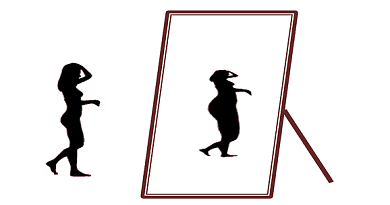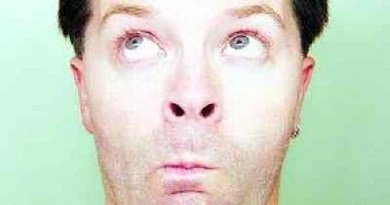Eating Disorders and Self-esteem

People who suffer eating disorders often have a distorted perception of their body. Your self-image influences your behavior. Also your self-esteem and confidence. It is the opinion of how you think you look to other people. It also involves how you see yourself and how you think other people judge you.
Eating disorders patterns will increase if you have a poor self-image, therefore, your self esteem will be low too. The most common factor for eating disorders is a lowered self-esteem and self-image. There is a relationship between eating disorders and self-esteem.
Some reason for eating disorders
- Emotional unresolved problems
- Need for control or need for acceptance.
- Physical, emotional, or sexual abuse
- Low self esteem.
The consequences of eating disorders include depression, obsessive-compulsive behavior, and anxiety and panic. Anorexia, for example, is an eating disorder in which people starve themselves. It is a serious psychological problem. Bulimia involves a destructive cycle of bingeing and purging. People with bulimia to avoid weight gain vomit, exercise in excess, fast, or take laxatives. And compulsively overeat. Despite feelings of guilt and shame, they feel unable to control their behavior or stop even when uncomfortably full.
According to my experience the better self-image you have, the better you take care of yourself. Regarding eating disorders the important issue is to listen to your body and you follow its needs. And of course to start building self esteem.
The key for me is to listen to your body. I carry healthy snacks and water with me wherever I go in case I get hungry. If you aren’t hungry, don’t eat, but if your body is asking for food to eat is important.
Our body knows what it needs.If we do not follow our body needs we develop eating disorders. We are so used to follow rules regarding when and what to eat that we usually forget to ask and listen to our body needs. If you start accepting who you are and see yourself as you are your self-image will improve.
Eating disorders affect your relationships
Reality bites. It’s as if everything can be viewed on a continuum that one moves from one level to another. And nothing’s as hard as finding one’s self-being unable to move freely in the continuum the world basks in. A perfect instance is in getting the right body shape or weight which concerns women and men alike. Acceptance and admiration are sought-after by many; hence, the idea of putting everything on the line just to get these becomes imperative.
Weight gain or loss is a prevalent issue these days. How people fancy over getting their ideal body shapes and weights consumes their daily living. Others go to fitness centers and do routines just to shed off some fats. Some go crazy over their diets that they spend a lot of time avoiding excess calories. Eating disorders may happen, say anorexia nervosa, because of an obsessive fear of weight gain. Let’s make a longer discussion on these eating disorders and their effects.
Eating disorders affect relationships. This may not be seen in an instant, but is true. Getting into one’s ideal body size is not as easy as eating peanuts. Time is needed to obtain the desired results. But often, too much attention in one’s body-transformation idea creates an oversight. The more important details of life tend to be overlooked as one gets busy, especially people.
Those routines unnecessarily lead to heartbreaks- with family, friends, or even the partner. Relationships are built and sustained through time. And what can be expected from someone who is too obsessed with his or her eating habits? Eating disorders may become substitutes for relationships with no proper attention.
Here is a line that has gone famous over break-ups – “You must be happy with yourself first before you can share that happiness with somebody else.” Relationships grow upon the initial pursuit of personal contentment, satisfaction, and joy. Eating disorders are sure ways to signal a lack of contentment and the absence of appreciation for one’s self. To dwell on these eating habits is in no way helpful when dealing with others. Everyone perhaps will agree that a desire for relationship is a person, not with any food or image obsession.
Eating disorders affect relationships in a lot of aspects. Apart from time and scary realization that one can’t give enough for somebody else’s happiness, more and more are finding eating disorders unacceptable and unreasonable. We find it stressful to find loved ones who starve their bodies or perhaps eat beyond comfort just to reach their ideal state. Parents, friends, and even spouses turn intrusive in discouraging or stopping those habits.
In the end, miscommunication can happen, and a person may view those relatives or friends as enemies. Or perhaps, the condition may become so bad that a person becomes mentally and psychologically unfit for a healthy relationship to exist. The body may even retaliate and pose serious illnesses that may need expensive medications. Finances can ruin relationships too.
Whatever happens, there’s more loss than benefit. The effects are reversible, but who knows how sufficient time is? There is none. Self-acceptance is a must if relationships have to succeed. Otherwise, learn to live alone. That is, however, a far greater impossibility.
Eating Disorders by Deepak Chopra
Deepak Chopra explains many ways to overcome this tendency, the most important one is to love yourself. Watch the video
The “self-image” is the key to human personality and human behavior. Change the self-image and you change the personality and the behavior. Maxwell Maltz
Have you tried this self-hypnosis downloads?
Stop Emotional Eating By learning to recognize the difference between emotional promptings and real healthy hunger you can begin to lose weight instantly and start to have the physical shape in life that nature intended for you.
When you overcome emotional food addiction for good, you begin to get what you truly need for fulfillment and true life satisfaction.
Understanding Eating Disorders
Types of Eating Disorders There are several types of eating disorders, and a lot of people are suffering from it. Some may cause weight gain while some may cause abrupt weight loss.







